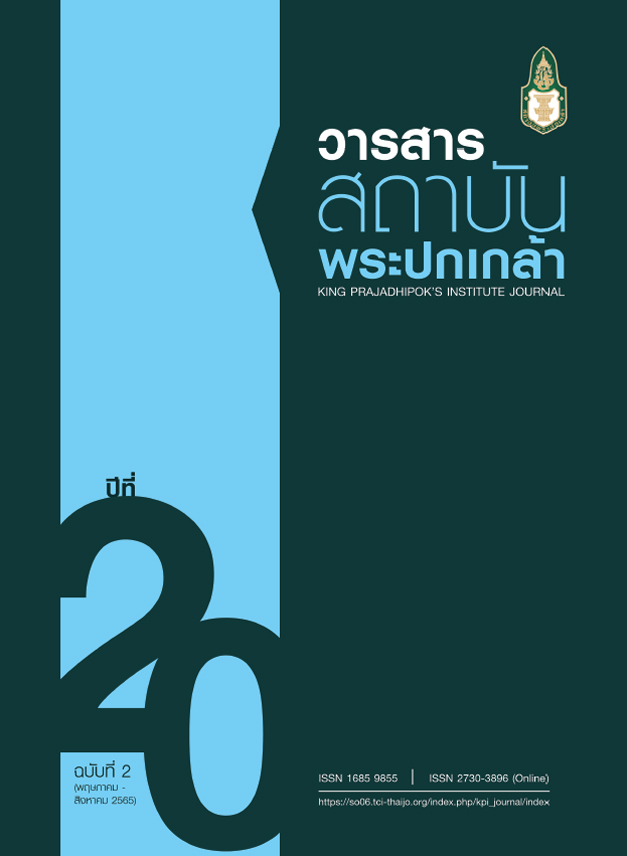Democratic Citizenship and Digital Literacy
Main Article Content
Abstract
The objectives of this research were 1) to study the digital literacy of Thai people in democratic regime, 2) to study the correlation between Thai democratic citizenship and digital literacy, and 3) to study the ways to promote digital literacy among Thai democratic citizens.
The research method consisted of a survey of opinions by means of questionnaires from a sample of 400 people, and qualitative data were collected through group discussion and interviews with 13 experts. The statistics used in the data analysis were percentage, mean score, and standard deviation. Opinion and behavior were compared with f-test (ANOVA) and correlation analysis was done between democratic citizens and digital literacy using Pearson Product Moment Correlation Coefficient (r).
The results showed that sample group had a high level of democratic citizenship ( = 3.28), with a high level of democratic values ( = 3.39), and sometime-demonstrated democratic values ( = 2.45). The sample group had a high level of digital literacy ( = 2.61), with a high level of digital proficiency ( = 2.89), and sometime demonstrated digital literacy behavior ( = 2.45)
Democratic citizenship was positively correlated with digital literacy at a medium to high level (r = .455). Awareness of rights is highly correlated to digital literacy, and public participation is correlated to digital literacy.
The research recommends that the government should establish a key framework for developing digitally literate democratic citizens at a national level. An authority should be established to collect knowledge, information, and develop tools to promote digital literacy and evaluate digital literacy status, and integrate digital literacy into the teaching and learning process. For agencies working to promote digital literacy, democratic values should be integrated into their work or developed into a curriculum for effective implementation, and there should be research to monitor and assess digital literacy of citizens according to international principles to keep up with changing situations of technology and the digital world.
Article Details

This work is licensed under a Creative Commons Attribution-NonCommercial-NoDerivatives 4.0 International License.
@ 2020 King Prajadhipok's Institute The Government Complex Commemorating All Right Reserved.
References
ภาษาไทย
กระทรวงดิจิทัลเพื่อเศรษฐกิจและสังคม. (2559). แผนพัฒนาดิจิทัลเพื่อเศรษฐกิจและสังคม.
สืบค้นจาก https://onde.go.th/view/1/Digital_Development_for_National_
Economic_and_Social_Development/EN-US
จารุวรรณ แก้วมะโน. (2561). รายงานวิจัยโครงการวิจัยวัดความเป็นพลเมืองในพื้นที่
บูรณาการจังหวัดร้อยเอ็ด. กรุงเทพฯ: สำนักส่งเสริมการเมืองภาคพลเมือง สถาบัน
พระปกเกล้า.
ณัฏฐกาญจน์ ศุกลรัตนเมธี และนุชประภา โมกข์ศาสตร์. (2562). การรู้เท่าทันสื่อสังคม
ออนไลน์ของเยาวชนเพื่อการเป็นพลเมืองในสังคมประชาธิปไตย. กรุงเทพฯ: สำนักวิจัยและพัฒนา สถาบันพระปกเกล้า
พีรวิชญ์ คำเจริญ และวีรพงษ์ พลนิกรกิจ. (2561). เด็กกับการรู้เท่าทันดิจิทัล. วารสารวิชาการนวัตกรรมสื่อสารสังคม, 6(2), 22-30.
พีระ จิรโสภณ และคณะ. (2559). ความรู้เท่าทันการสื่อสารยุคดิจิทัลกับบทบาทในการกำหนดแนวทางการปฏิรูปการสื่อสารในสังคมไทย. กรุงเทพฯ: มหาวิทยาลัยธุรกิจบัณฑิตย์
สุภิญญา กลางณรงค์. ผู้ร่วมก่อตั้ง COFACT- พื้นที่ตรวจสอบข่าวลวง และ อดีตกรรมการ
กิจการกระจาย เสียง กิจการโทรทัศน์ และกิจการโทรคมนาคมแห่งชาติ. (2564, 9 สิงหาคม). สัมภาษณ์.
อุษา บิ๊กกิ้นส์. อาจารย์ประจำ คณะนิเทศศาสตร์และนวัตกรรมการจัดการ สถาบันบัณฑิตพัฒนบริหาร
ศาสตร์. (2564, 29 กรกฎาคม). สัมภาษณ์.
เอนก เหล่าธรรมทัศน์. (2551). การเมืองภาคพลเมือง. กรุงเทพฯ: สำนักพิมพ์คณะรัฐมนตรี
และราชกิจจานุเบกษา.
ภาษาอังกฤษ
Arendt, Hannah. (2019). Conception of Citizenship in Stanford Encyclopedia of
Philosophy. Retrieved from https://plato.stanford.edu/archives/fall2019/
entries/arendt/
Belshaw, Douglas A.J., (2011). What is digital literacy?: A Pragmatic investigation.
(Doctor Dissertation) Durham University, Department of Education, Durham. Retrieved from http://creativecommons.org/publicdomain/
zero/1.0/
Best, J. W. (1981). Research in Education. (4th edition.). New Jersey: Prentice –
Hall Inc.
Chawaporn Dhamanitayakul. (2018). Conceptualizing Digital Citizenship for
Digital Natives in Thailand. (Doctor Dissertation) National
Institute of Development Administration, The Graduate School of
Communication Arts and Management Innovation, Bangkok.
Cochran, W.G. (1977). Sampling Techniques. (3rd edition), New York: John
Wiley & Sons.
De Vaus, D.A. (2002). Survey in Social Research. (5th edition). New Zealand:
Allen & Unwin Publishing.
Kemp, Simon. (2021). Digital 2021: The Latest Insights into the State of Digital. Retrieved from https://wearesocial.com/uk/blog/2021/01/digital-2021-the-
latest-insights-into-the-state-of-digital/
Internet World Stats. (2021). Internet World Stats – Usage and Population
Statistics. Retrieved from https://www.internetworldstats.com/stats.htm
Marshall, T.H. (1950). Citizenship and Social Class. Cambridge: Cambridge University Press.
Russell, Dalton. (2009). The Good Citizen. Washington: CQ press.
Starkey, Louise. (2012). Teaching and Learning in the Digital Age. London:
Routledge.
UNESCO. (2018). A Global Framework of Reference on Digital Literacy Skills for
Indicator 4.4.2. Information Paper No. 51 June 2018 UIS/2018/ICT/IP/51.
Retrieved from http://uis.unesco.org/sites/default/files/documents/ip51-
global-framework-reference-digital-literacy-skills-2018-en.pdf
Westheimer, Joel. (2015). What Kind of Citizen? Educating Our Children for the
Common Good. New York: Teachers College Press.
Worldometer. (2021). World Population. Retrieved from

